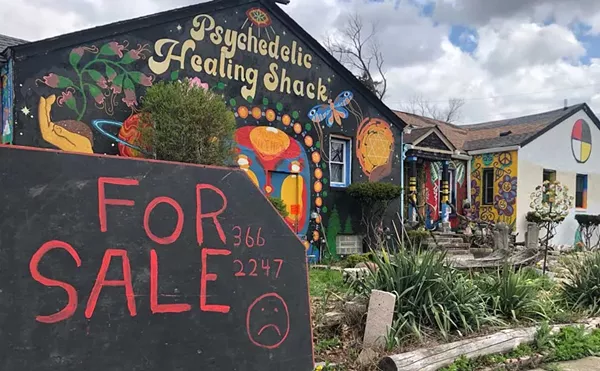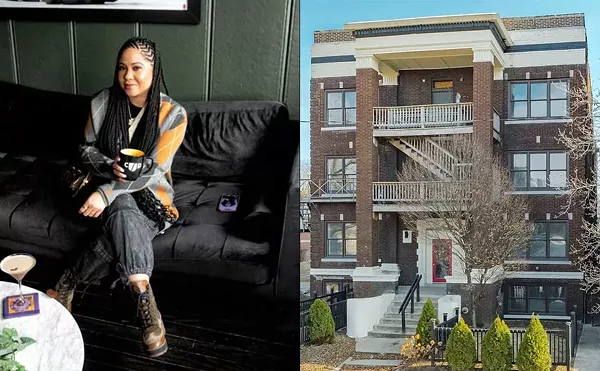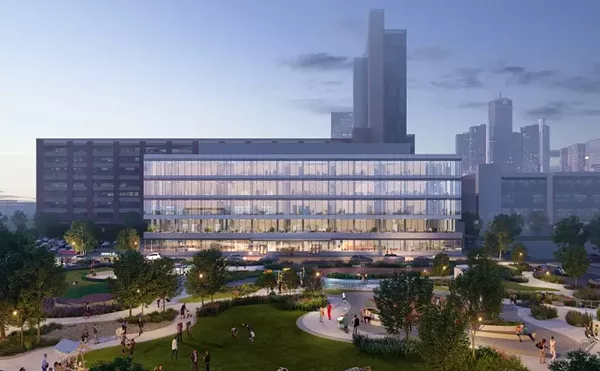
Audio By Carbonatix
[
{
"name": "GPT - Leaderboard - Inline - Content",
"component": "35519556",
"insertPoint": "5th",
"startingPoint": "3",
"requiredCountToDisplay": "3",
"maxInsertions": 100,
"adList": [
{
"adPreset": "LeaderboardInline"
}
]
}
]
So they’ll vote for a new mayor and council next week, in this city that put the world on wheels and now lies largely in semiruins.
And most of you shrug and think it doesn’t matter much, out there in West Bloomfield and Warren and Livonia. If you think about it at all, you hope it isn’t some “nasty” white-bashing man like Coleman Young.
But really, for you who neither live nor work in the city, it seems irrelevant. “Detroit is never coming back, is it?” a well-to-do writer asked (really, told) me the other day. “It really is hopeless.”
Well, it better not be. The tragedy is that most Detroiters won’t even take part in next week’s primary or even November’s final election. No, politics can’t solve everything, and yes, whoever is elected won’t be able to solve all Detroit’s problems. Yet it is a place to start. And it matters. Had a couple thousand more African-Americans in Florida gotten to the polls last November (and many thousands didn’t show) a whole lot would be different now.
Everything I know tells me we are looking at a runoff between Kwame Kilpatrick, just turned 31, and Gil Hill, 70, on Election Day. Yet there are others.
“How about a discussion of ‘all’ the candidates? There are candidates for mayor, council and city clerk who have yet to receive even a mention in your ‘alternative’ publication,” a reader wrote.
Well, he’s right. I should have taken more time to do that, and so should this paper. Some of those candidates are not really serious, but many have some ideas worth thinking about.
Last week, Metro Times looked at the top six mayoral hopefuls. The editors endorsed Bill Brooks, the only one gutsy enough to utter the forbidden word “poverty,” and say his emphasis would be on helping the poor escape it. That’s a pretty brave thing to say these days. We don’t want to think about the poor anymore; they aren’t socially acceptable, and sometimes smell bad. What we old white liberals (and even some nouveau noir arrivistes) secretly think is that, well, we tried to help them back in the ’60s, but the buggers just wouldn’t shape up and behave.
So we’ve given up. Nobody even talks about wiping out poverty any more. After all, we half-heartedly tried to do that for about 10 minutes back in 1965, before losing ourselves in Vietnam. Been there, done that.
But the fact is that we never really gave it half a chance. What is wrong is really all about poverty. Poverty, and the breakdown of society. Few images are more hauntingly terrifying than that dysfunctional pregnant child-woman handing her baby to a stranger at a bus stop in the wee hours of the morning. Whereupon said stranger then evidently bashed its head in, and tossed the tiny body under a mattress in an abandoned house. We weren’t nearly surprised, or outraged, enough.
Yes, Detroit is the way it is largely because of white racism and greed, as I have said many times. But it can’t improve unless those who live there now — African-Americans — start taking responsibility for their actions and demanding the same of others. Malcolm X, like Jesus, has a lot of casual followers who would be very uncomfortable if they really read him. Once, he said bitterly that if white America turned all its corporations over to African-Americans, they’d have them all back again in six months because the blacks wouldn’t work hard enough or smart enough.
The other day I got a letter complaining that I thought Detroit’s neighborhoods needed to become like the suburbs, and that I was off-base to complain that most didn’t have shopping facilities. I needed more imagination, the writer said. Well, yes, I plead guilty again. Even in my most fanciful utopia, people stubbornly can’t get beyond eating and buying necessities, and wanting something nice to call their own.
Detroit can be fixed, if we really want to fix it. Cities have come from further down. But the next mayor will need to be more than just a mayor; he will need to be willing and able to use his office to really reach the people of the city. Dennis Archer was good at reaching out to corporations. Someone needs to reach the streets and inspire people to be responsible.
That doesn’t mean they have to be conservatives or straight or listen to Frank Sinatra. It means they ought to value work and respect life, take responsibility for their actions and keep their personal space cleaned up. That will be much harder than getting Compuware to put up a building. It is also vastly more important, and the only way to do it is to give people hope for a better future, hope that Detroit will help them build one.
“We can do well in this country,” Robert Kennedy told an angry ghetto the night Martin Luther King was shot. We can do well, he added, if everyone, black and white, focused on justice and improving the quality of life for everyone. That was in a long-ago time when a few politicians inspired people to believe in a better future.
“Every man can make a difference, and every one should try,” John F. Kennedy once said. That’s what I hope people will think about when they vote, now and in November. And when Detroiters vote for City Council, I hope they think about the billboards advising us to re-elect all six incumbents running. Shouldn’t that automatically make you suspicious? Are things going so well we ought to re-elect all those there now? Think. And vote, for whomever you think might inspire us to roll up their sleeves and get to work. There’s an awful lot to do.
Jack Lessenberry opines weekly for Metro Times. E-mail letters@metrotimes.com




